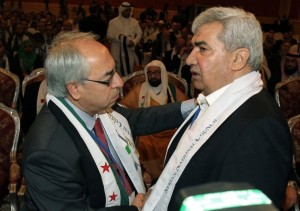 The Syrian National Council voted for new leaders at a conference here on Wednesday, a last-ditch attempt to restructure the organization into a more inclusive body and maintain U.S. support.
The Syrian National Council voted for new leaders at a conference here on Wednesday, a last-ditch attempt to restructure the organization into a more inclusive body and maintain U.S. support.
The United States has been increasingly frustrated with infighting among the opposition group’s leaders and doesn’t believe that it represents all of Syria’s ethnic and religious groups or has legitimacy among activists. Last week, Secretary of State Hillary Rodham Clinton criticized the group and said the SNC could no longer be considered the “visible leader of the opposition.”
Deep divisions also have surfaced over a plan introduced by SNC member Riad Seif, a prominent opposition figure who was jailed repeatedly in Syria, to start a new organization that could include a broader set of opposition groups.
Seif’s proposal, known as the Syrian National Initiative, calls for much closer ties with opposition groups inside Syria, including local political and military councils, according to SNC members familiar with the plan.
The plan also calls for closer ties to the Free Syrian Army, planning for a transition period after the fall of Syrian President Bashar al-Assad and even the formation of a transitional government
While some SNC members have supported the proposal, others have accused Seif of working with American officials to undermine the SNC.
“Some are calling this the Robert Ford plan or an American plan,” said Radwan Ziadeh, an SNC member who is the executive director of the Syrian Center for Political and Strategic Studies in Washington. Ford is the U.S. ambassador to Syria who has been meeting with some opposition figures on the sidelines of the conference.
Ziadeh added, “This is just promises from the Americans that no one is believing. They don’t need Seif to come with a plan. This is unrealistic.”
Seif’s proposal will be discussed among opposition representatives at a conference here on Thursday.
As the SNC held its election Wednesday, the Syrian military carried out attacks across the country that killed at least 109 people, according to the opposition Local Coordination Committees.
Rebel forces also carried out a series of attacks in Damascus, according to the official Syrian Arab News Agency. Judge Abad Nadweh was assassinated in the capital when a bomb attached to his car was detonated remotely.
That attack comes a day after Mohammed Laham, the brother of the speaker of parliament, was shot and killed by gunmen while driving to work in Damascus, according to official media reports.
And three people were killed Wednesday in a series of mortar attacks in the Mezze 86 neighborhood of Damascus, which is viewed as largely pro-government. The neighborhood was rocked by a car bomb on Monday.
Rebel fighters also detonated a truck bomb at the Al Nabak bridge in Damascus province Wednesday, killing at least six government troops, according to the Syrian Observatory for Human Rights.
The escalating violence in Syria, where an estimated 200 people are killed each day, is worrying its neighbors. Turkey has been in talks with NATO allies about the deployment of Patriot missiles along its southern border for protection against attacks by the Syrian military, the Turkish press reported Wednesday.
Wednesday’s SNC election was held to fill 40 slots in the organization’s general secretariat, which will then choose an11-member executive committee. The executive committee will select a new president for the organization.
Despite the divisions at the conference, many SNC members realize that U.S. support is crucial for the Syrian opposition. Abdul Basset Sayda, the current head of the SNC, said that President Obama’s reelection was a key moment to push the Syrian conflict back onto the U.S. foreign policy agenda.
“For Mr. Obama, this is the day to do something to stop the killing inside Syria,” he said. “Because if the situation continues in this way there will be extremism, fundamentalism and no stability in the area.”
Washington Post

Leave a Reply
You must be logged in to post a comment.